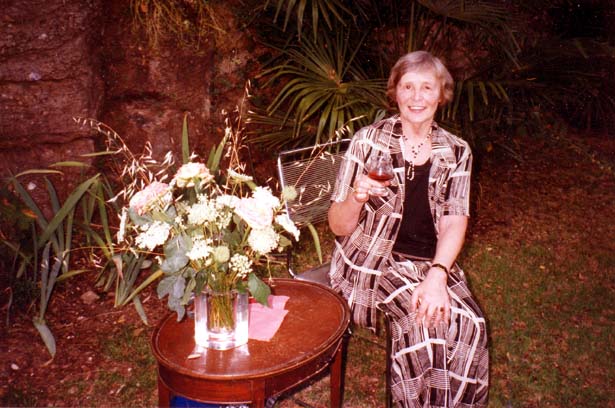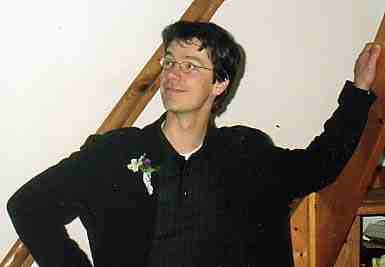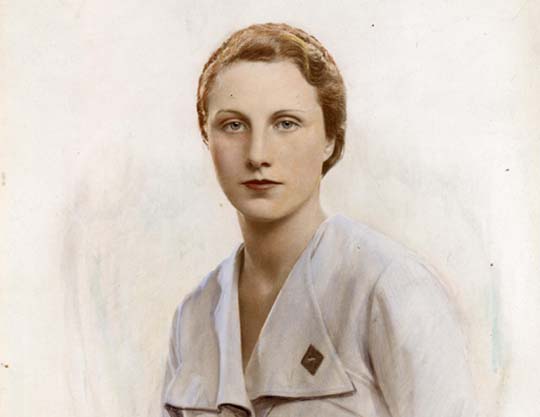Who was Marita Gunther?

Marita,
Marita Günther. As I say these words I see her face. A face that is utterly
sincere, a face that observes you with interest but behind it is a depth of
understanding, a desire to make contact, to almost embrace, without overstepping
the boundaries of each contact.
I first saw Marita in 1951/52. Roy was giving a ‘drama class’
in the downstairs front room of 139, Golders Green Road, NW11. At the end
of the class we were all sitting around talking when a new face appeared in
the doorway, glanced into the front room and moved on down the corridor into
the kitchen. This face, backed by two long plats, looked serious, tired and,
without any antagonistic vibes, just wanted to remain alone. I learned that
this was Marita Günther, a distant cousin of Awe’s who worked as
an usherette in the local cinema, she had lessons during the day and lived
in the house with some other pupils. Her late spell of work explained her
exhausted appearance but behind the tired face was a very serious person.
Marita had just gone through the terrible war years in Leipzig. Her mother
and father were separated, her mother’s family were deported to ‘work
camps’ but her mother was allowed to remain free only because of the
status of her father, she had to report weekly to the Police Station. Marita
was very aware of her Jewish origins, believing that all the girls in her
school knew that she was Jewish, and that they looked down upon her. In fact
when she returned to the school years later to meet again with many pupils
in her form – to her amazement they had absolutely no idea of her Jewish
origins. Her brother had fought in the Germen army and had been taken prisoner
by the Russians, where he remained for the rest of the war. It often hit both
of us that but for the luck of the draw, our brothers could have been out
there fighting each other.
However, there was a terrifying moment in the war when she could well have
been killed by British bombing – Leipzig was almost flattened on the
night of 4th December 1943. The date became a land mark in the history of
the people of Leipzig.
The end of the war did not end Marita’s problems. The Russians took
over Leipzig and because she was not of the proletariat, she could not attend
the university course she had planned. So she escaped to England where she
had to work as a domestic servant for two years, before getting English Nationalisation.
As her mother and Awe were related, she contacted him and soon started to
have singing lessons.
She later worked in the office of the shoe company BATA, translating letters
into German for a very withdrawn young man who scarcely communicated at all.
One morning he was dictating a letter. He suddenly stopped and said, “Günther,
that’s a German name, isn’t it?” “Yes” she replied.
“Where are you from?” “Leipzig” she replied. There
was a long silence. “Were you there on the 4th December 1943?”
he asked. “Yes” Marita replied. He went completely ashen and looked
as if he were going to faint. There was a long silence. Finally he spoke:
“I was in the air” he said. From that moment on he treated her
like a princess, making sure she had every comfort, speaking to her as if
a burden had been lifted.
Marita and I became particularly close as Awe’s illness worsened and
we spent a lot of time together looking after him. After his death we again
spent time together working on songs - with me at the piano - also on translating
The Bridge.
We were truly soul-sisters. One day, whist staying here on one of her many
precious visits, I was constantly moaning about the world in general, when
she said, quite simply, “There is no point in worrying about anything
that you cannot yourself correct.” - advice that I have passed on to
so many people. This practical way of coping with problems got her through
many difficult times in her life. Her other method of coping was to attach
herself with utter devotion to a new adventure, for example learning to play
the piano - yet never seemingly upset when her ambition was not fulfilled.
After the move to France she went through a rather difficult time until she
took the large step of returning to Germany. There, at Hanover University,
she completed her life circle, returning to her first love, initially interrupted
by the war - the study of literature. Finally, her group of Marita Singers
in Germany gave her great joy, friendship and love, fulfilling her life as
a teacher.
Sheila Braggins, London 2009
Ralf Peters from Köln, a student of the Roy Hart Theatre of long standing, now a fully recognized teacher. Wrote this in May 2002 after Marita's death:

I have just read the letters that I wrote to Marita during the last three years. I didn't know her for a long time, nearly four years except for a brief meeting at Malerargues six years ago. But she belonged to the very few people to whom I wrote about the death of my father last year in spring. This tells (me) something about her importance for me. During my stay at Malerargues springtime 99 I asked Marita if she would give me some voice lessons although I knew that she didn't want to work with new students. But Clara encouraged me to ask her because she knew that Marita was very much interested in philosophy and I had just finished my studies of this subject at university. This was the key! She accepted me as a student and in the evening we met having a glass of red wine and philosophical talks. We both enjoyed these few evenings very much. She was glad to have someone she could tell about her studies in Hannover and I learned a lot about the philosophical implications and the cultural sources of Awe’s understanding of the human voice. In these talks she helped me to build a bridge between philosophy that was for years the centre of my (often not very vital) life and the new challenge that already had started to change my life: the voice.
From this time on we stayed in a not very regular but deep contact. We had telephone calls, we wrote some letters, I visited her in Minden, I was once a guest in a workshop in Hannover with her "women" (she was so proud of them!). I sometimes complained that we couldn't meet more often but I at the same time knew that the 'contacts from the distance' were also part of her teaching. She liked to say that Awe taught how to sing in teaching how to live. This is what she learned from him. As far as I know she did everything in her life with great seriousness, nothing was only peripheral, but at the same time she did it with great joy. Who knows better ingredients for a good life? Seriousness and joy.
When I heard that Marita was gone, I was very sad. No more opportunity to talk, to sing with her. But the way we could say good bye to her in Minden, the possibility to be with her lying in the house of Frau Born, the strong peacefulness in Marita’s face made it easy to say good bye. I am sure in one way or the other the "contact from the distance" will last.
Thank you Marita.
Ralf Peters, Koln, May 2002.
Irene Silber, mother of Paul Silber

Paul - My mother and Marita were close friends for many years before we moved to France in 1975. As you will see below Marita introduced my mother, Irene to Alice Croner who was one of Alfred Wolfsohn's earliest students in Berlin in the 1930's. She was responsible for his escape from Germany to England in 1939. Unfortuately at that time, 25 years ago,I was completely unconcerned with the RHT archives unlike as I am now, I therefore lost for ever the oppertunity of finding out more about that very late escape from Nazi Berlin. Marita wanted me to have a copy of a letter that Alice had sent to Irene, here it is.
Marita - "Dear Paul,
Here is the extract of the letter I wanted to show you:-
Alice - "December 20th 1980
Dear Irene,
One day in the future when Marita will stand at the Gates of Heaven, St Peter will ask her: "Well, my child, now tell me, what have been your good deeds, while you were on Earth??"
And Marita will answer: "Let me think! O yes, one of them was that I introduced my friend °Alice Croner° to my friend Irene Silber."And St. Peter will say : "You need not tell me of any others. Come on in!!"
Again reciprocating all your good wishes
Love Alice"
Marita - "Irene had written a note on the left hand corner of that letter":
Irene - "Thought Paul might enjoy this! Alice is unique! Marita might also enjoy it!"
Marita - "Just these few words brings both these personalities clearly before my minds eye. When I looked at my Diaries from 1980 backwards I found this entry, recording their first meeting together: "
"13th March 1979 - We meet for lunch at Lindys - Irene to meet Alice"
Marita - "So you see they hit it off immediately - they telephoned each other, wrote letters to each other, met for lunches at the Cosmo, for coffees at Lindys - I believe rarely in each others houses;
Each time I went to London I would, of course, visit Irene. The ritual would be a Sherry while giving her the news - especially any news about her Paul - followed by an exquisite little lunch in her big room, finishing with coffee. An affectionate good-bye at the front door and the promise to come again soon.
Both these two extraordinary Ladies had one thing in common and that was their intense engagement in life. With Irene, this was through her life of Theosophy and with Alice it was through her life's work on her dreams for The Jungian Institute.
I think Irene's love of me had something to with my very special link to Paul.
Alice died on the 26th August 1985, and Irene on the 17th April 1988. This means that their relationship lasted about 6 years. To this day I am happy and proud that I was the instrument of bring them together.
So, dear Paul, when we three Ladies come together at the gates of St. Peter to drink our glass of Sherry together, we will speak to him of you very favourably!
Much love Marita"
Malérargues Jan 2002.
Paul,
to day in 2009 - "I though this might show you all something of
who Marita Gunther was!"
Paul Silber Maleragues August 2009